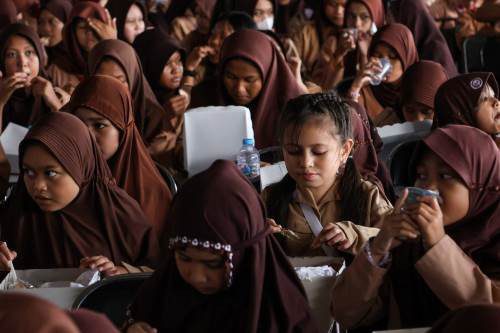December 3, 2024
jakarta – The government has defended its decision to cut the budget of President Prabowo Subianto’s flagship free nutritious meals program, saying lower prices will still allow authorities to provide high-quality meals to students and pregnant women.
President Prabowo announced at a press conference on Friday that the government had set a budget of 10,000 rupees (63 cents) per meal for the program, down from his original estimate of 15,000 rupees.
The news sparked widespread concern over whether the government can meet the program’s ambitious goal of providing free nutritious meals to some 82.9 million schoolchildren, teachers, pregnant women and infants.
Hassan Nasbi, head of the Presidential Communications Office, said the government has piloted a free meal program in Java in recent months, with a budget reduction of Rp 10,000 per meal.
“At this price, we can provide students with meals of about 600 to 700 calories per serving,” Hassan said on Saturday, Antara reported.
Also read: Indonesia considering ban on social media for children
Coordinating Minister for Social Empowerment Muhaimin Iskandar said on the same day that after maintaining a budget of Rp 10,000 per meal in the first year of the program, the authorities will allocate more funds in the coming years.
“Despite the limited budget, we will ensure that the quality of the meals is good, including ensuring nutrition and freshness,” he said.
At a press conference on Friday, the president cited fiscal constraints as the reason for the decision to cut the per-meal budget.
“We wanted to fix the price at Rs 15,000 per share but the financial situation [accommodates only] Rs 10,000. We have calculated that 10,000 dong is enough to provide a good quality and nutritious meal in most areas.
As a centerpiece of Prabowo’s election campaign, the main goals of the free nutritious meal program are to combat childhood stunting and malnutrition and to develop quality human resources.
Also read: Government promises 6.5% pay rise next year, but is reluctant
Prabowo’s transition team said before taking office in October that the free meals program would be implemented in phases towards full implementation in 2029, with annual costs expected to reach 450 trillion rupiah ($28 billion).
The government has allocated Rp 71 trillion for the implementation of the first phase of the program next year to provide food for about 19.4 million school children and pregnant women.
Observers question whether Prabowo’s government is capable of handling the logistical scale required to deliver the programme. They also expressed concern about the potential burden the plan would place on the state’s finances and economy.
Regardless, Prabowo has repeatedly expressed his commitment to the plan as a “strategic” national initiative.
After taking office, the president said he believed Indonesia could emulate India’s decades-long success in providing free meals to school children, even though its per capita GDP is lower than Indonesia’s.
Prabowo also said he believed the plan would bring economic benefits to farmers and food producers across the country.









